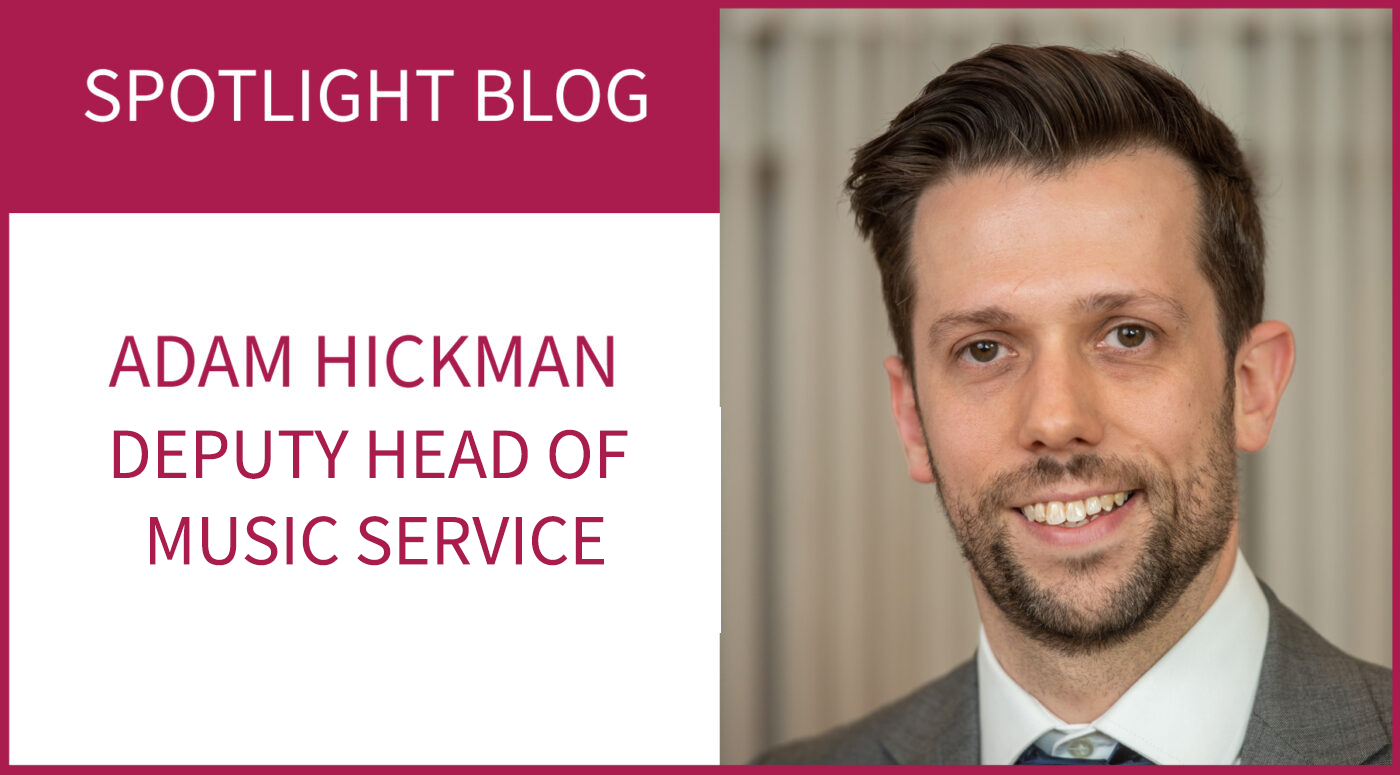Advice For Schools, Meet the Team
How Music Education Needs to Evolve in the Post-Pandemic Era
As we plan for a life beyond the pandemic, what does the future of music education hold for our children and young people? We discuss this challenging subject matter with the Deputy Head of Music Service at Services For Education, Adam Hickman.
Music education is a vital and valuable subject contributing towards a child’s overall learning and development. It has the power to combine the creative, physical, intellectual, and emotional parts of the brain.
Music also embeds the behaviours young people need to take their place in an ever-changing world. As Plato once said.
“Music gives soul to the universe, wings to the mind, flight to the imagination and life to everything”.
However, music education is facing a myriad of challenges in the post-pandemic era.
To shed some light on these growing issues, we caught up with a graduate and honorary member of the Royal Birmingham Conservatoire and the Deputy Head of Music Service at Services For Education (SFE), Adam Hickman.
The Key to Partnerships for Music Education
With a lifetime dedicated to music and over 13 years at Services For Education, Adam has witnessed first-hand the transformational impact of music education on children and young people across the city of Birmingham.
In Adam’s mind, central to this transformation is partnerships – between schools, parents, pupils, communities, the Music Service, and the wider Birmingham Music Education Partnership (BMEP).
For more than sixty years, The Music Service has worked in close partnerships with schools, enhancing and supporting music education for all pupils. Extensive programmes of high-quality support are afforded to students through specialist vocal, instrumental, and classroom teachers.
“We recognise that a high-quality music education should be punctuated by various milestones in the learning process.”
“A particular highlight every year is the annual Youth Proms at Symphony Hall. It is often a culmination of many hours of rehearsals, which give thousands of Birmingham pupils each year the opportunity to perform in an authentic performance environment. It is a true example of effective partnership work on many levels and offers a starting point for pupils to build upon.”
Despite the impact partnerships can have on a child’s music education, recent restrictions caused by the pandemic has naturally caused some complications.
Awaiting the Impacts of the DfE Model Music Curriculum and the DfE National Plan for Music Education
Music education faces what might be another pivotal moment in the latest DfE Model Music Curriculum (MMC) and an update to the DfE National Plan for Music Education (NPME).
“Since joining The Music Service in 2008, there have been changes in both the education and arts / cultural landscape. We are entering another crucial period in music education following the release of the DfE Model Music Curriculum (MMC), and an update to the DfE National Plan for Music Education expected very soon.”
The MMC is a non-statutory document. Therefore, it offers guidance and ideas for teachers with a suggested approach to implement a music curriculum. For the right standards of music education to be delivered through MMC, Adam points out the crucial implementation of continuing professional development (CPD) for teachers.
The Vital Role of CPD for Teachers in Supporting Music Education
The two clear and crucial factors for sustaining an excellent music education in all schools and colleges providing programmes and courses is the strong reciprocal union between both teaching and learning.
“Schools must focus on enhancing and augmenting the music education they offer through performance opportunities, singing, learning to play musical instruments, and ensuring there are clear progression routes available for learners. Secondly, another crucial role will be facilitating a network of CPD activity that both supports and connects teachers.”
Adam suggests effective partnership working is an approach that could be used to support schools by providing high-quality CPD professional learning to support teachers in delivering curriculum music lessons.
“This framework could be implemented between local schools, within multi-academy trusts or between schools and the BMEP. Providing the right resources and opportunities for children must be matched with a well-established CPD structure supporting teachers to provide that education.”
“One of the biggest challenges for those responsible for improving professional learning and CPD strategies is establishing a balance between developing whole school priorities, alongside strengthening pedagogical approaches within specific subjects.”
Is a New Approach Required in Education Following the Pandemic?
The ramifications of the pandemic had enormous impacts on our society, not least our education system. With music being such a socially interactive subject, what steps should its approach to learning take as a way of adapting to a changing world?
“For me, technology can help connect teaching communities. To coincide with this commitment to CPD and professional learning, Services For Education has launched a unique online video resource to support new and existing music teachers. ReelMusic is the first digital resource of its kind, created specifically for music hubs, schools and universities. It is not simply a resource bank but a tool to develop professional conversation and dialogue between colleagues and to encourage deep thinking about teaching and learning in music.”
Maintaining In-Person Partnerships Should Remain a Priority
Recognising innovative, forward-thinking technology can offer a solution, but we cannot forget the importance of in-person partnerships.
The opportunity to collaborate in person and connect colleagues from neighbouring schools is also essential post-pandemic. Taking advantage of the freedom now granted to host events and performance opportunities should always remain on the agenda as a crucial aspect of our children’s development in music education.
“For the 4th consecutive year, we will be running our annual Birmingham Music Education Conference on Friday 29th April 2022 at The Midlands Arts Centre.”
The appropriate theme of the Birmingham Music Education Conference is “Reset, refresh and reinvigorate learning”. This event allows teachers and education professionals to join music leads across the city for a dedicated day of subject-specific CPD.
We hope to see professionals from across primary, secondary, and special school settings in attendance, sharing ideas and taking advantage of the professional learning and networking opportunities available.
If you would like further advice or support with the music education curriculum, take a look at our range of courses and resources.


 Lucie Welch – Adviser, Services For Education
Lucie Welch – Adviser, Services For Education Jo Perrin - Adviser, Services For Education
Jo Perrin - Adviser, Services For Education
 Marsha
Marsha 


